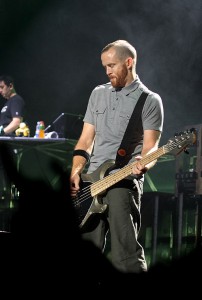
Tonight sees the Sunset Strip Music Festival kick off with honoree Joan Jett performing at the House of Blues. Headliner Linkin Park will close the SSMF on Saturday night with an outdoor set.
Linkin Park bassist Dave “Phoenix” Farrell spoke with us about the group’s involvement with the SSMF, LP’s humble beginnings on the Strip and how it’s using music as a platform for awareness and change.
Question: What’s new?
Answer: “We’re finishing up rehearsal today, preparing for the SSMF and immediately after that show, we’ll be heading to Asia for a couple of weeks. We’ve been getting our live show ready to go.”
Q: How do you prepare for a tour?
A: “It’s just a matter of figuring out what we want to do with our set. Making sure the newer songs are as locked in as some of the older ones.”
Q: What about the SSMF performance?
A: “One of the things that we find most exciting is the fact that we started on the Sunset Strip. The first show we ever played was at the Whisky. We developed between there and The Roxy. It’s fun to go back and play with a lot of bands we haven’t played with in a long time.”
Q: What size of venue do you prefer, large or small?
A: “We still get opportunities here and there to do more intimate things, albeit, it’s not what it used to be. There’s a different kind of energy in a small room. You can see all the faces. There’s a ton of energy when we play the larger festivals. It’s also nice to be able to play larger shows.”
Q: Which shows stand out the most in your mind?
A: “Some of the most memorable ones were the first few on the Sunset Strip. It’s probably more because, at that point, Brad [Delson] and I were going to UCLA. To play those venues, we had to buy tickets up front and try to sell them to friends. We were hustling to get 200 tickets sold at $4 bucks a piece, so we could break even. The only way to do it was to throw a party at our apartment after the show, but if you wanted to party, you had to buy a ticket and go see us play first.”
Q: How is the experience different now?
A: “We played a show every month or two with all that work and stress leading up to it, then we’d play our half-hour set, if we were lucky. It was a huge accomplishment and for the next few weeks we felt that high of having a successful show. Those are the most memorable because they were more frightening than shows now could ever be. When you’re starting out, you’re doing your own gear and sound and it feels like if something goes wrong, a bad show could just ruin everything. After doing it for a while, you realize, everything that could go wrong will at some point and your life still hasn’t ended. Of course, now we’ve got a lot of paid professionals, making sure my bass works when they hand it to me.”
Q: What advice do you have for up-and-coming musicians?
A: “Now more than ever, with the Internet and home studios, it’s about making it happen for yourself. No one is going to work harder for you than you. If you’ve got the skills, a little bit of luck and you put in enough work, it will be undeniable and people will want to help push it to the next level.”
Q: How did you get involved in Music for Relief?
A: “It was something we actually started about 10 years ago as a disaster relief organization and grew out of that into an environmental organization as well. We don’t necessarily see ourselves as a fundraising organization but more of an awareness organization. Some don’t have money to give but maybe they can donate time, talent or connections in social media to get the word out. Another thing we’ve really been working on is an initiative called Power The World, in conjunction with the United Nations. Addressing energy poverty and the fact that over 1.3 billion people, over one fifth of the world’s population, do not have access to sustainable energy. It’s not a sexy issue that people talk about but we have to inform and educate upcoming generations.”
Q: Are you ready for Saturday?
A: “We’re not playing any more shows in the U.S. in 2013. This is kind of our last chance for a while. Plus the area has such a history for us, a lot of our fans from there have been with us for such a long time, growing with us since our the very earliest building stages. It’s going to be a lot of fun.”
